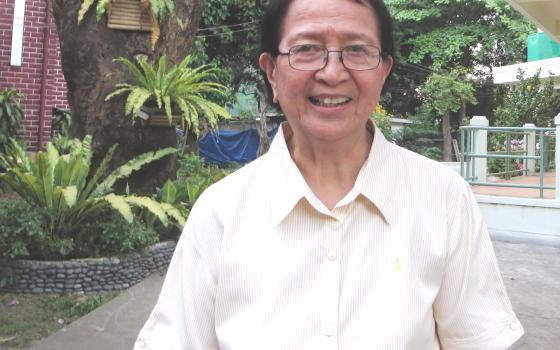With the April arrest and 22-hour detention of Sr. Patricia Ann Fox of the Sisters of Our Lady of Sion, the Rural Missionaries of the Philippines has been in the news.
One of several mission partners (sometimes called task forces) of the Association of Major Religious Superiors in the Philippines, the Rural Missionaries of the Philippines is described as "a broad alliance of lay and religious missionaries in the countryside." The organization consists of volunteer members from different religious congregations of women and men, Filipinos and non-Filipinos, and now includes some laypeople.
Fox was national coordinator of the Rural Missionaries of the Philippines from 2000 to 2008 and continues to be a member. She was threatened with deportation and had been given 30 days to pack up and leave, but was recently given a reprieve pending her appeal with the Department of Justice. It is, therefore, not surprising if the Rural Missionaries of the Philippines is on the government's watch list.
Founded in 1969, the Rural Missionaries of the Philippines has seen different phases in Philippine history, including national upheavals and changes in the church. Its members have made breakthroughs in the church's missionary endeavors and immersed themselves in the rural grassroots communities they serve.
GSR spoke with the current national coordinator of the Rural Missionaries of the Philippines, Sr. Elenita Belardo of the Religious of the Good Shepherd, who has been with the organization since 1977.
GSR: Why is there a need for the Rural Missionaries of the Philippines when religious congregations are present in rural areas? What is its vision and mission?
Belardo: There are places were religious are not present. We envision a community of Christ's disciples living as credible witnesses of God's mercy and compassion. We want to see the rural poor living joyfully and enjoying the fruits of their labor, participating in decision-making, owning the land they till and preserving the integrity of creation toward the attainment of life, justice and peace.
What was the organization like in the beginning?
When some of us first set out in Isabela province in Northern Philippines, the rural folk, it turned out, were the ones who taught us many things, among them, how to live simply as religious. Since then, it has been a continuing journey in solidarity with the peasants in their quest for land justice and freedom.
How many men and women religious are with the Rural Missionaries of the Philippines right now? What is the arrangement with their congregations?
Right now, Rural Missionaries of the Philippines has 177 missionaries from different congregations. In the beginning, religious sisters from different congregations lived together. But now, Rural Missionaries of the Philippines from the same congregation stay together but work with religious from other congregations.
What are some problems, challenges or limitations you face?
We are few in number vis à vis the many challenges, for example, in the area of land reform, peace talks, as well as threats to the lumad [indigenous] communities' ancestral domain. Under the present administration, 110 leaders have been killed, 66 of them in Mindanao.
The Rural Missionaries of the Philippines is only one of several mission partners of the Association of Major Religious Superiors in the Philippines. What is the source of funding and support?
We get financial support from the German bishops' MISEREOR and from congregations like the Redemptorists.
The Rural Missionaries of the Philippines has lay members, too. Are they compensated? Do they undergo formation?
The lay have allowances. Yes, they undergo training and exposure. We have also the Friends of the Rural Poor [founded in 2011] that can accommodate those who cannot be full time with the Rural Missionaries of the Philippines.
Could you talk about the Friends of the Rural Poor?
It aims to catalyze Christians and people of good will toward a broad-based and dynamic advocacy movement around issues that affect farmers, fisherfolk, indigenous people and agricultural workers and is concerned with promoting their struggle for land justice and freedom.
Who do you want to recruit to Friends of the Rural Poor?
We invite religious, priests, lay church workers, members of academia, lawyers, journalists, medical practitioners and other professionals who are unable to become Rural Missionaries of the Philippines members but who wish to support Rural Missionaries of the Philippines' work.
What is the Rural Missionaries of the Philippines' biggest challenge now compared with the past?
We seem to be helpless with mining. [As this went to press, Salakyag, a weeklong anti-mining caravan that began May 28 in southern Philippines and is supported by the social action arm of the Catholic Bishops' Conference of the Philippines, had reached Metro Manila. The caravan will pass by and dialogue with Department of Environment and Natural Resources officials and end in the vicinity of Malacanang, the presidential palace, on June 5, World Environment Day.]
Tribal disputes are settled among themselves. There are warlords with private armies in some areas.
President Rodrigo Duterte has issued warnings on schools for indigenous people that he suspects could be ideologically infiltrated, implying he might close these down and bring in businesses instead. What is the Rural Missionaries of the Philippines' stand?
These suspicions are generated by fake news. We support the lumad schools. In August 2017, the Rural Missionaries of the Philippines issued a statement to disprove the suspicions. We condemned President Duterte's threat to bomb lumad schools and asked that he withdraw his threat. These tribal schools are part of the Philippine education system's Alternative Learning System. They are not illegal, and they do not train rebels.
Please describe the areas where the Rural Missionaries of the Philippines operates and its variety of ministries.
We are in the northern, central and southern Philippine provinces. We have a variety of ministries in communities: sustainable agriculture, rural schools, disaster-risk reduction, climate change mitigation, health services, defense of human rights, education and training for peasants, organic farming. We support people's advocacies.
Why is the Rural Missionaries of the Philippines important in the church?
We do the mission of Jesus. As he said in Luke 4:18, "He has sent me to bring good news to the poor, to proclaim liberty to captives and to the blind new sight, to set the downtrodden free." And in John 10:10: "I have come that they may have life and have it to the full."
The first line of the encyclical Gaudium et Spes says: "The joys and the hopes, the griefs and the anxieties of the men of this age, especially those who are poor or in any way afflicted, these are the joys and hopes, the griefs and anxieties of the followers of Christ."
What is the common denominator among the Rural Missionaries of the Philippines members aside from their being Catholics?
Our mission, vision and goals bind us. We call to mind the statement of the 2nd Plenary Council of the Philippines that "the Church of the Poor is one that will be in solidarity with the poor. It will collaborate with the poor themselves and with others to lift up the poor from their poverty."
[Ma. Ceres P. Doyo is a journalist in the Philippines. She writes features, special reports and a regular column, Human Face, for the Philippine Daily Inquirer.]

